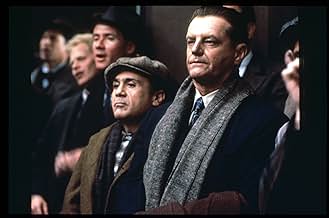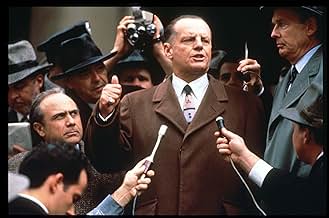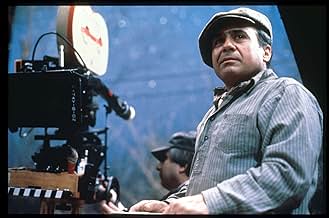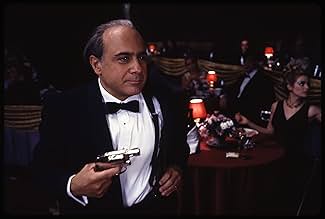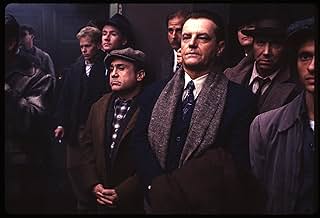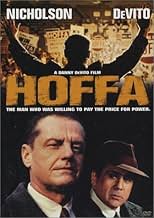La historia de la famosa figura del sindicato estadounidense Jimmy Hoffa, quien organiza una huelga amarga, hace tratos con miembros del sindicato del crimen organizado y desaparece misterio... Leer todoLa historia de la famosa figura del sindicato estadounidense Jimmy Hoffa, quien organiza una huelga amarga, hace tratos con miembros del sindicato del crimen organizado y desaparece misteriosamente en 1975.La historia de la famosa figura del sindicato estadounidense Jimmy Hoffa, quien organiza una huelga amarga, hace tratos con miembros del sindicato del crimen organizado y desaparece misteriosamente en 1975.
- Dirección
- Guionista
- Elenco
- Nominado a 2 premios Óscar
- 2 premios ganados y 6 nominaciones en total
- Loading Foreman
- (as Joe V. Greco)
- Dirección
- Guionista
- Todo el elenco y el equipo
- Producción, taquilla y más en IMDbPro
Opiniones destacadas
Mamet's Hoffa knows the Kennedy family built their fortune out of rum running to a large extent, and he sees no difference between their corruption and his own compromises. At least, Hoffa tells himself, his own deals with the devil serve something larger then his immediate family, they serve the membership of the union. And this was very true, which is why a fair number of Teamsters still swear by the name Jimmy Hoffa. Nicholson's snide asides to his "betters" completely captures the class war basis that motivated the actual man's actions. Anyone who has been through an actual labor dispute and has been witness to the patronizing communications that come through a company eager to crush a union effort knows full well what fired up Jimmy Hoffa, even as we turn aside from the path he took.
The film succeeds because De Vito, Nicholson and Mamet understand what pushed the labor movement forward, and they understand its contradictions. Most important, they understand why those contradictions overwhelmed a man as gifted as Jimmy Hoffa, and this is what makes it better then your average Hollywood drama about labor. Hoffa is a film about working class attitude that gets beneath the usual dismissals of working class concerns, and as such, deserves respect. The powers that be have every legend about their leadership. It's time the working class was allowed legends about its own once again, provided we understand that they are legends, and therefore laden with much myth. The very real larger then life qualities of Jimmy Hoffa, however, make this a film worth more then one critical glance.
Unfortunately, the film is an inadequate showcase for Nicholson's talents. The story begins in 1975 on what presumably was the last day of Hoffa's life as he and his pal Bobby Ciaro (Danny DeVito) wait for some people to show up for a meeting at a Michigan roadhouse. They wait a long time which allows Bobby to recall many incidents in Hoffa's extraordinary career as a union organizer.
There are two problems with this. First Bobby, who's supposed to be something of an enforcer, is never credible. Although he's nearly always in view, he never seems to belong. Perhaps that's because he's entirely a creation of screenwriter David Mamet. Barely adequate as a story-telling device, Bobby's unfortunate insertion gives rise to the inevitable, more serious question: how much of this story is true?
If you accept Mamet's interpretation, Hoffa was a victim of a trusted associate, the Government, and the Mob, but foremost a hero because he fought for the working man. Fair enough. But when you watch "Hoffa" you don't really get a clear sense of why all this was so. Motivations are largely absent. The flashbacks pass by but you feel these are merely sketches or outlines, often presented without clear context. Some are believable, others seem to be mere speculation, still others, such as the scenes with Robert Prosky or the enormous riot sequence, implausible. Was Prosky's character real? Did so many people actually die? Ask Bobby, because in many ways it's as much his story as Hoffa's; but as we know, Bobby is pure fiction.
Mamet has been quoted as saying audiences look more for drama than for information. Fine, and who'd want to see Ken Burns' take on the Teamsters. But "Hoffa", for all its huffing and puffing, lacks the drama of Paul Schrader's "Blue Collar" or the better Mob pictures.
Recommended solely for Nicholson's performance.
This is not to belittle the film's educational value, but I don't think such a complex public figure can be understood if we don't even have some quick glimpses about his past, his background and his family. It's as if Danny DeVito sticked with the public image of Hoffa and didn't give us enough to hook our hearts on outside the Teamster business, which is a pity because Jack Nicholson made the character and gave him such an aura that it genuinely made me curious about the man. Yet, nothing is shared except what he tells his friends, the mob, the journalists, and Bobby Kennedy. I was begging for an intimate moment with his wife, not because "behind every great men, there's a woman" but because men do confess to their wives, share with them the off-the-record stuff, but "Hoffa" is not in the same caliber than, say, Oliver Stone's "Nixon", which is about a no less controversial figure. And I guess I wasn't surprised because I saw the wife in the middle of the film but because she was showed while she was useless plot-wise.
On the other hand, the film tackles its subject in a very serious and entertaining way that I'm asking myself if DeVito or the screenwriters did have enough material to approach the privacy of Hoffa, maybe they didn't, or maybe they had but they didn't have enough time. The film is more trying to answer to the question of Hoffa's whacking than the typical rise and fall, it's more about the way he became an instrument of the mob with a pragmatic view on the ends- justifies-the mean theory, but we never see how effective they are for the Teamsters. I learned more about the rights and the struggle of truck drivers from the underrated film-noir "They Drive by Night" or the thriller "Wages of Fear" than "Hoffa", which is saying a lot because it had to be about trucks too, Ebert said that DeVito showed a man who was all about trucks, he talked and breathed 'truck', well how about showing these trucks in the first place? The film fails providing insights on the character by focusing too much on the controversy; it doesn't help to get enough perspective. Imagine if "Nixon" was only about the Watergate, you wouldn't have known about Nixon AND the Watergate either, DeVito's film lacked focus and scope.
It's interesting that the film was made in 1992, the same year than another and better biopic, Spike Lee's "Malcolm X", the film is three-hour long but takes you from the roots of the leader, when he was a small-time crook to his rise as one charismatic orator. In "Hoffa", we never see him driving a truck, nourishing his heart with socialist ideas and revolting against the system. From the beginning, he's like a politician haranguing the comrades. I take it from granted than what he say is true, but it's not about belief, but empathy, the film is not about making Hoffa a good or a bad guy, but letting the viewer figuring out. If he was bad enough (in the "practical" meaning) to stick with the gangsters when he became powerful, it would be interesting to see how he started as an idealistic man, and it would make the corruption of his morality more interesting. That's what great biopics are about: evolutions, and never in "Hoffa", do we feel that the guy is changing, in bad or good, it doesn't matter, but there's no dynamics whatsoever.
And again, it's a pity because the performances are good, I can't believe Nicholson got a Razzie nomination for this, granted it wasn't the best of his career, but he did bring some energy and passion in the character. But what lacked was a structure, a right choice of episodes that would tell us something about a controversial figure. The film is two-hour and fifteen minutes long, I wouldn't have minded it being much longer if it could enlighten me on the private face of Jimmy Hoffa, we're talking about a character played by Nicholson, who's got a great chemistry with his real-life friend Danny DeVito, the film had the potential, the ambition, probably the budget, the writing was good, but the storytelling not so.
Still, for what it is, it's not wasted time, and the film has a solid consistency in it, and at least, it does something that almost redeems the flaws I mentioned: it ends with the best scene, the most memorable one. In terms of shock and emotion, even though we know the story of Jimmy Hoffa, we don't see the ending coming, and it did left me puzzled and shocked when I saw it for the first time. The film needed more moments like this, but all in all, it's a solid drama.
Can I first say this was strange casting for Bobby Kennedy? It just seems like someone doing a very poor Kennedy impersonation, not a serious attempt to really capture him. Which is unfortunate, given how central his role is. (This film, more than anything, seems to be Hoffa versus Kennedy.) The Nicholson casting is not perfect, either, because it is hard to hide his distinctive voice... but I think he pulls it off ,and the makeup helps.
The Hoffa story is a fascinating one, and one that deserves to be explored on film again. This was 1992, and I write this in 2015. In the past two decades, more memoirs have been written, more government documents released... we need another biopic, and maybe a really serious documentary?
¿Sabías que…?
- TriviaThe only major make-up Jack Nicholson had to wear to become Jimmy Hoffa was fake nose and a set of false upper teeth (as seen in the behind-the-scenes footage on the DVD).
- ErroresWhen Jimmy and Billy torch bomb the building, they create a blast so intense, it blows out the passenger side window on Bobby's truck. Yet in the following shots, the window goes from being intact, to being shattered.
- Citas
Jimmy Hoffa: If a guy's close to you, you can't slight 'im. You can't slight that guy. A real grievance can be resolved; differences can be resolved. But an imaginary hurt, a slight - that motherfucker gonna hate you 'til the day he dies.
- Créditos curiososthere are no opening credits and the title of the film at the beginning.
- Versiones alternativasOn a special laserdisc edition, Danny DeVito hosts a supplemental portion of the disc with outtakes, including a scene where Hoffa perfectly shoots a beer bottle with a rifle.
- Bandas sonorasLet's Make Love Tonight
Written, Produced and Performed by Nicky Addeo
Selecciones populares
- How long is Hoffa?Con tecnología de Alexa
Detalles
Taquilla
- Presupuesto
- USD 35,000,000 (estimado)
- Total en EE. UU. y Canadá
- USD 24,276,506
- Fin de semana de estreno en EE. UU. y Canadá
- USD 6,406,012
- 27 dic 1992
- Total a nivel mundial
- USD 29,302,121
- Tiempo de ejecución2 horas 20 minutos
- Color
- Relación de aspecto
- 2.39 : 1
Contribuir a esta página




